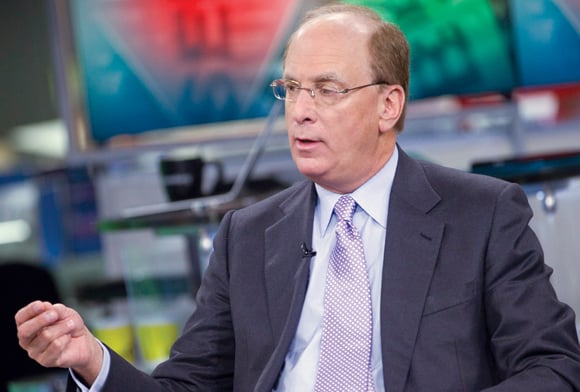BlackRock Inc. chief executive Laurence Fink on Monday confirmed what many already had expected when he said he planned to cut the fees on a number of iShares exchange-traded funds to better compete with lower-cost providers.
“We are going to have to reduce fees,” Mr. Fink told attendees at the Barclays Capital Financial Services Conference in New York. “I am not here to suggest we are going to be announcing a wholesale fee change on everything. We are going to be focusing on a number of products, whereby the competition at lower fees is accelerating their sales numbers versus ours.”
The focus most likely will be on the 15 asset classes in which BlackRock's iShares funds compete directly with Vanguard Group Inc. and its low-cost ETFs. Across those 15 categories, which include emerging markets, global equities and real estate investment trusts, Vanguard's ETFs have attracted 70% of the inflows over the past three years, according to a recent AllianceBernstein LP research note.
“A fee cut could go a long way toward helping their products compete more directly,” said Mike Rawson, an ETF analyst at Morningstar Inc.
The battle between the two firms' emerging-markets ETFs is the clearest example of the shift that's been under way. The iShares Emerging Markets ETF (EEM) and the Vanguard Emerging Markets ETF (VWO) track the same index but the Vanguard ETF has an expense ratio of 0.22%, 45 basis points lower than the iShares product.
Over the past three years, there's been a clear preference for less expensive options. Vanguard's emerging-markets ETF has had inflows of $39 billion over the period while the iShares ETF has suffered $1.1 billion of outflows.
Not surprisingly,
BlackRock has been steadily losing market share across its whole ETF lineup. It holds about 40% of the $1.2 trillion in ETF assets, down from 48% in September 2009, according to Morningstar. Over the same period, Vanguard has increased its market share to 20%, from 11%.
Until recently,
BlackRock had defended the fees on its ETFs staunchly, focusing instead on the advantage offered by the secondary market liquidity of its ETFs.
The one time
BlackRock did cut its fees worked out very well. In July 2010, the money manager announced it would reduce the expense ratio of the $10 billion iShares Gold Trust (IAU) to 0.25%, from 0.40%, making it 15 basis points cheaper than the $71 billion SPDR Gold Shares ETF (GLD). Both ETFs offer investors direct ownership of gold bullion.
Since the rate cut, the iShares gold ETF has had $4.9 billion of inflows, compared with just $1.8 billion for GLD, from State Street Global Advisors, according to Morningstar.
Cutting fees may not be a cure-all for BlackRock, however. In its research note, AllianceBernstein said it was difficult to tell whether BlackRock's falling market share was a result of direct competition from Vanguard or growing demand for ETFs among retail investors, an area in which Vanguard has a clear advantage.
BlackRock made its biggest push to woo retail investors earlier this year with the launch of its first
branding campaign.
Mr. Fink said the campaign would be reignited in October.
“We believe we have huge opportunities to build our brand in retail, worldwide, and we believe we are going to really make a large change on that front,” he told attendees at the Barclays conference. “It's a major component of how we are positioned going into the future.”
While BlackRock has been losing market share, it isn't suffering broadly from withdrawals. Since 2009, BlackRock ETFs have enjoyed $63 billion of inflows, second only to Vanguard's $73 billion. And with more than $500 billion in ETF assets, it remains the largest ETF provider by more than $200 billion or so.







